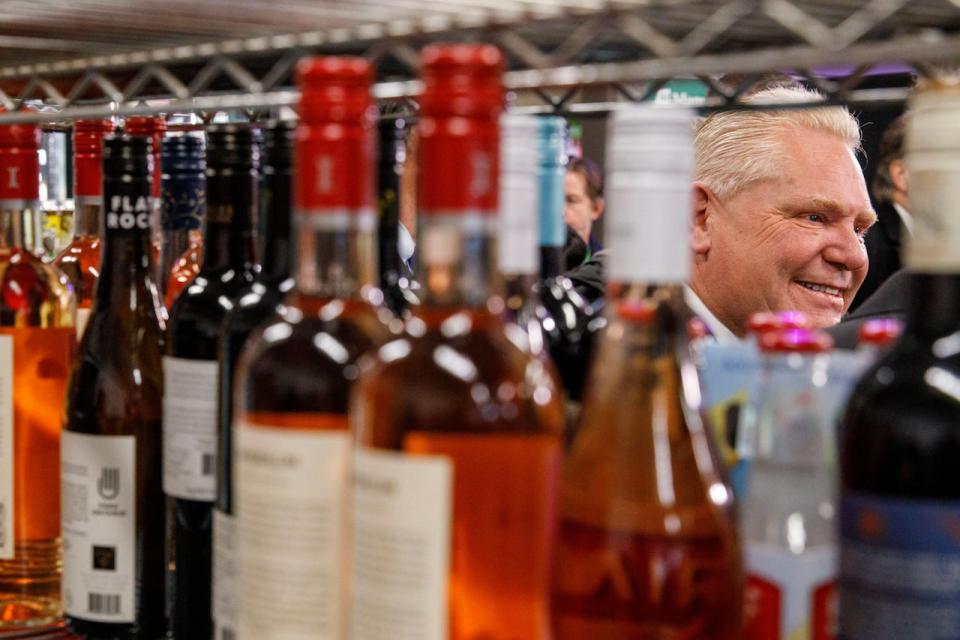There have been mixed reactions at Waterloo Region grocery stores to Premier Doug Ford’s plans to increase the number of places where Ontario residents can purchase alcohol.
Erin Sinclair, bakery manager at Geddes Street Market in Elora, said her store applied for and received a license to sell alcohol because there aren’t many options nearby to buy alcohol.
“We were excited when we heard they were opening it up to a few more grocery stores and hoped it would bring in more revenue as well,” Sinclair told CBC News.
“Quite a few people have asked if we carry wine.”
The Ontario government announced in May that it would allow the sale of beer, wine and ready-to-drink cocktails in corner stores and other supermarkets 16 months earlier than planned. The province would have to pay up to $225 million to The Beer Store for the move.
Retailers, including convenience stores and petrol stations, will be able to sell the low-alcohol drinks from September 4, while all other supermarkets and grocery stores will be allowed to sell canned beer, wine, cider and spirits from October 31.
The province said the process to apply for a licence with the Alcohol and Gaming Commission of Ontario (AGCO) began on June 17.
“This is a pretty big deal”
Sinclair said the Geddes Street Market has been stocking up on alcohol as it awaits the Oct. 31 launch of sales. She said the community response has been “pretty good.”
“It’s a pretty big deal, also because we’re open on holidays – because we’re an independent store and can be open – people are pretty excited about it too,” Sinclair said.
Carmine Caccioppoli, co-owner of Vincenzo’s Waterloo branch, said his store has decided against applying for a license.
“Due to limited space, we have decided not to allow many of our employees who are high school students to work here because they are minors,” Caccioppoli said.
“That’s going to create real difficulties for the store, and fortunately we’ve always had a great liquor store here in Uptown Waterloo, just about a block away. So there really was no need to offer additional amenities because it was already very close.”


Premier Doug Ford is seen during a news conference announcing the provincial government’s plan to allow alcohol sales in convenience stores, at a Circle K convenience store in Etobicoke on Dec. 14, 2023. (Alex Lupul/CBC)
Caccioppoli said the store offers non-alcoholic versions of all spirits, wines and beers, and demand for those products has “exploded in the last year” and now accounts for a very large portion of the business.
“So we just decided to keep doing that – to differentiate ourselves a little bit from what other places are offering and become a go-to place for non-alcoholic options,” he said.
“It’s about choosing the location,” says the professor
Dan Malleck, a professor of health sciences at Brock University in St. Catharines, said consumers care more about choice in terms of the variety of products available in stores than variety of locations.
“The premier and the finance minister talked about giving Ontario citizens more choice when it comes to 8,500 places where they can buy alcohol, but the choice is based on the place, not the product in it,” Malleck told CBC News.
“Most of these convenience stores will not be converted into craft beer specialty stores. They will carry the fast-moving products and the more popular products.”
“So it’s not about choosing the products, but about choosing the location,” added Malleck.
Malleck, who is also an expert in drug and alcohol regulation and prohibition, expects this new license to encourage more specialty stores to open, such as wine shops or craft beer stores. However, these will be filtered through the Liquor Control Board of Ontario (LCBO) system.
Thousands of LCBO workers went on strike on July 5, resulting in 600 stores closing for two weeks in the province of Ontario.
The more than 9,000 LCBO employees went on strike after collective bargaining between their union, the Ontario Public Service Employees Union (OPSEU), and the employer failed.
Workers want pay increases, more full-time positions and language in the collective agreement that protects existing jobs and the future of the LCBO. According to the union, 70 percent of the LCBO workforce is part-time.

